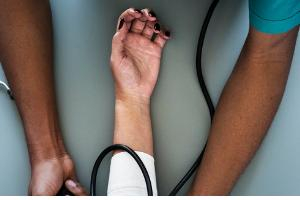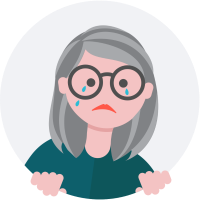Cancer diagnosis: Carenity members tell their story
Published Feb 25, 2020 • By Josephine O'Brien
Our members affected by cancer have told the story of their diagnosis. Symptoms, emotions, examinations, relationships with their doctors.
Carenity survey of 112 cancer patients in the United Kingdom and United States.


On average, patients waited less than a year to be diagnosed and the majority consulted 2 doctors before reaching their diagnosis.
The journey to being diagnosed with a condition can be long. Fortunately for patients suffering from cancer, the average journey to diagnosis is less than one year after showing symptoms. During this period, respondents said that they experienced different symptoms. A small percentage of respondents reported that they suffered from no symptoms at all so their diagnosis was more of a surprise. However, overall depending on the cancer, the symptoms ranged from different severities and locations but the majority of patients complained of the following:
Blood in urine | Chronic pain | Sore lump | Cough | Shortness of breath | Night sweats | Back ache | Loss of sex drive
Before the diagnosis: the impact of cancer
We asked our members what aspects of their daily life had been affected by these symptoms caused by cancer?
 Love life - 45%
Love life - 45%
 Chronic fatigue -54%
Chronic fatigue -54%
 Family life - 38%
Family life - 38%
 Hobbies and activities - 38%
Hobbies and activities - 38%
 Social life - 37%
Social life - 37%
 Professional life - 29%
Professional life - 29%
 Chronic pain - 21%
Chronic pain - 21%
Sadly for our members suffering from cancer, they found their love life to be the most impacted by the symptoms of their cancer before diagnosis. This can perhaps be connected with the decrease in sex drive and fatigue that was reported. Fortunately, chronic pain was the least felt impact by respondents.
Before diagnosis, only 38% of patients did their own research on the Internet concerning their symptoms and they reported using websites such as the NHS, Mayo Clinic, McMillan Cancer Support and just inserting symptoms into Google. Several respondents mentioned that they knew the symptoms from family members having suffered from the same cancer or because they themselves were employed in the medical sector so they knew the signs.
Respondents to our survey were not enthusiastic about or practitioners in alternative medicines, with only 7% responding positively to having tried them. Those who did try alternative therapies used acupuncture, herbal medicines, turmeric tablets and cannabis.
Being diagnosed with Cancer: what you had to say
For many diseases, the road to being diagnosed is hindered with misdiagnosis. However, this was not the case for the majority of the respondants to our survey. Only 12% were subjected to a diagnosis error, which is good news for cancer patients as it means they can commence their therapy as soon as possible and have a much higher survival rate.
According to Carenity members, they were misdiagnosed with having generalized anxiety disorder, prostatitis, hemorrhoids, back pain, cystitis, kidney stones and fibromyalgia.
The shock of the diagnosis
Being diagnosed with cancer is a traumatic and life-changing event. We asked respondents how they felt after being For others, it was a shock and a traumatic event. How did Carenity patients react to their diagnosis?
 It wasn’t a shock, I was expecting it - 35%
It wasn’t a shock, I was expecting it - 35%
 It was horrifying - 24%
It was horrifying - 24%
 I didn’t feel anything in particular - 22%
I didn’t feel anything in particular - 22%
 It was a shock - 21%
It was a shock - 21%
 It was a relief - 8%
It was a relief - 8%
Finding out that you have cancer can be a frightening event but surprisingly, 35% said they were expecting it while 7% of patients can’t remember how they felt at all. Unlike other chronic conditions, where getting a diagnosis can sometimes be met with relief, the majority of cancer respondents felt more horrified rather than relieved.
The role of doctors and healthcare professionals
The role of the healthcare professional making the diagnosis is key. Sometimes patients do not feel sufficiently listened to or informed about their condition. The good news is that the majority of Carenity members felt that their doctor took their time telling about their diagnosis whilst also being calm and emphatic. The main problem members found with their doctor was the feeling that they didn’t care and they were cold and distant delivering the diagnosis. However, the positives far outweighed the negatives for patients and their healthcare providers.
The following statistics show how members felt their doctors handled the situation of relaying their diagnosis to them:

59% - The doctor was very calm
57% - The doctor took the time to explain
37% - The doctor was very emphatic
11% - The doctor offered psychological support

12% - They were cold and distant
7% - They were too fast explaining
6% - They looked like they didn’t care
5% - They used cold and scientific language
The patient's struggle when facing cancer
We asked our members how they felt emotionally after receiving their diagnosis, whether they felt determination or despair for their future medical journey. Many members responded having felt several emotions at once and this is what they had to say:
25% of patients felt relieved by the diagnosis but this was coupled with 58% feeling a great deal of anxiety. This anxiety was coupled with shock and surprise, according to 31% of respondents. 28% reported feeling lost, confused and alone, 14% felt anger about their diagnosis, 6% of patients had the sensation of being misunderstood whilst only 6% felt discouraged.
Fortunately, 45% felt determined to fight the disease but only 9% had confidence for the future while 17% felt despair.
How can diagnosing cancer be improved?
The most common problem that patients had when receiving their diagnosis was a lack of sensitivity. One member stated their doctor seemed “full of himself” while another patient felt “rushed” as sections of the ward were being closed as the news was being relayed. One respondent was harrowed by their experience as they felt like “a corpse” because they were being used as an example to train a student doctor.
Several respondents said a massive improvement that could be made would be having a doctor that they already know to tell them the news because some of them “never saw the doctor before or after the diagnosis” which made the exchange feel cold and removed.
Many others wished they had received some sort of warning or instruction to bring a loved one with them. Receiving the news alone was very “traumatic” for one member and they felt very lost and confused while having to make their way back home by themselves afterwards.
However, overall the majority of patients seemed satisfied with how they were told. They did want more “follow-up services and instruction” because shock can prevent information about treatment and care being adequately digested.
And what is your story?
Let's share our experiences and that of our loved ones in the comments on this article to improve diagnosis of cancer!

 Facebook
Facebook Twitter
Twitter



